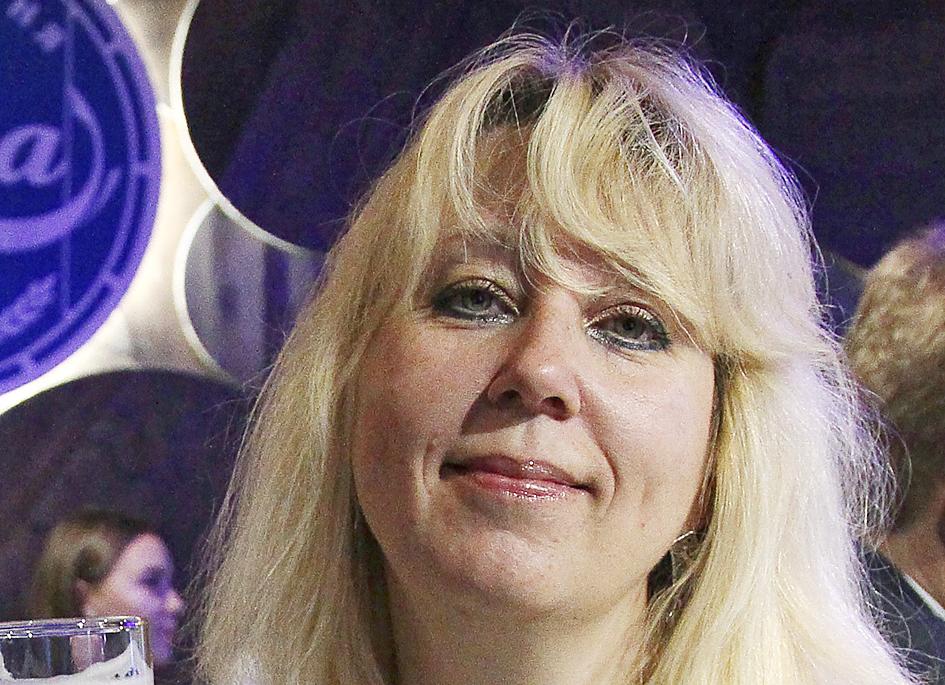The editor of a Russian independent news site died on Friday after setting herself on fire following a police raid in a probe targeting an opposition group, her Web site said.
The news site Koza.Press in the city of Nizhny Novgorod reported that its editor-in-chief, Irina Slavina, had “set herself on fire in front of the police headquarters.”
Investigators in the city later confirmed her death in a statement saying that her body had been found with “signs of thermal burns,” while saying there was “no basis” to connect her death to police raids as she was only a witness in a probe.

Photo: AP
The journalist had written on Facebook hours before her death: “I ask you to blame my death on the Russian Federation.”
A video posted on social media reportedly showed her setting herself on fire on a bench.
Slavina’s Web site carried out investigative reporting and covered opposition to Russian President Vladimir Putin, her friends and supporters said, a rarity in regional journalism, which faces pressure from local authorities.
She “died from her injuries,” her site reported, saying that her husband had confirmed it.
The site became inaccessible shortly afterward.
Her death prompted tributes from journalists and activists, including human rights advocate Pavel Chikov, who wrote on the Telegram messenger that he had worked with her twice when she was charged with disrespecting the authorities and publishing false news reports.
Slavina had on Thursday written on social media that police and federal guards burst into her flat in an early morning raid.
She said that they were searching for evidence of links to Open Russia, an opposition movement funded by Kremlin critic Mikhail Khodorkovsky that has been ruled undesirable by the authorities, amid allegations that it funded protests in the city.
“I don’t have anything,” the journalist said, adding that police confiscated her notebooks and computer, as well as laptops and phones belonging to her, and her husband and daughter.
“I have no means of production,” she said.
Opposition leader Alexei Navalny, who is recovering in Berlin after being poisoned in Russia with what German doctors said was a military-grade nerve agent, described Slavina’s death as “terrible.”
“A criminal case was fabricated against Slavina under a political charge. Yesterday, her home was searched, doors were cut out and computers confiscated,” he wrote. “They absolutely drove her to suicide.”
Local news Web site NN.ru reported that people were holding a vigil in Slavina’s memory on a city street, with one man holding a placard saying: “The state kills.”

ACTION PLAN: Taiwan would expand procurement from the US and encourage more companies to invest in the US to deepen bilateral cooperation, Lai said The government would not impose reciprocal tariffs in retaliation against US levies, President William Lai (賴清德) said yesterday, as he announced five strategies to address the issue, including pledging to increase Taiwanese companies’ investments in the US. Lai has in the past few days met with administrative and national security officials, as well as representatives from various industries, to explore countermeasures after US President Donald Trump on Wednesday last week announced a 32 percent duty on Taiwanese imports. In a video released yesterday evening, Lai said that Taiwan would not retaliate against the US with higher tariffs and Taiwanese companies’ commitments to

Intelligence agents have recorded 510,000 instances of “controversial information” being spread online by the Chinese Communist Party (CCP) so far this year, the National Security Bureau (NSB) said in a report yesterday, as it warned of artificial intelligence (AI) being employed to generate destabilizing misinformation. The bureau submitted a written report to the Legislative Yuan in preparation for National Security Bureau Director-General Tsai Ming-yen’s (蔡明彥) appearance before the Foreign Affairs and National Defense Committee today. The CCP has been using cognitive warfare to divide Taiwanese society by commenting on controversial issues such as Taiwan Semiconductor Manufacturing Co’s (TSMC, 台積電) investments in the

‘SPECIAL CHANNEL’: Taipei’s most important tasks are to stabilize industries affected by Trump’s trade tariffs and keep negotiations with Washington open, a source said National Security Council Secretary-General Joseph Wu (吳釗燮) arrived in the US for talks with US President Donald Trump’s administration, a source familiar with the matter said on Friday. Wu was leading a delegation for a meeting known as the “special channel,” the Financial Times reported earlier. It marked Trump’s first use of the channel since returning to the White House on Jan. 20. Citing a source familiar with the matter, the Financial Times reported that Minister of Foreign Affairs Lin Chia-lung (林佳龍) was also a part of the delegation. The visit came days after China concluded war games around Taiwan and amid Trump’s

HELPING HAND: The steering committee of the National Stabilization Fund is expected to hold a meeting to discuss how and when to utilize the fund to help buffer the sell-off The TAIEX plunged 2,065.87 points, or 9.7 percent, to close at 19,232.35 yesterday, the highest single-day percentage loss on record, as investors braced for US President Donald Trump’s tariffs after an extended holiday weekend. Amid the pessimistic atmosphere, 945 listed companies led by large-cap stocks — including Taiwan Semiconductor Manufacturing Co (TSMC, 台積電), Hon Hai Precision Industry Co (鴻海精密) and Largan Precision Co (大立光) — fell by the daily maximum of 10 percent at the close, Taiwan Stock Exchange data showed. The number of listed companies ending limit-down set a new record, the exchange said. The TAIEX plunged by daily maxiumu in just